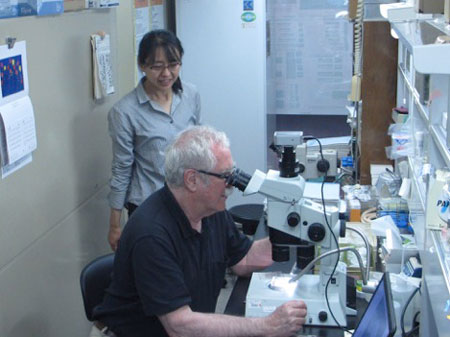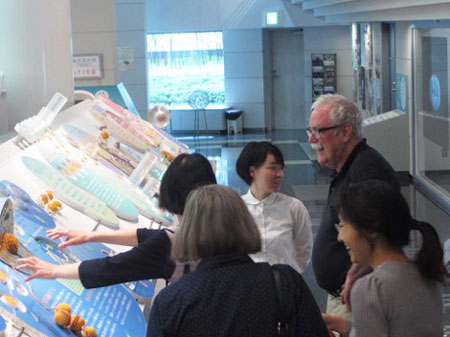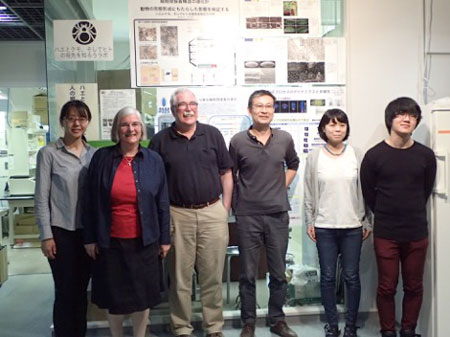BRH welcomed Dr. Eric Wieschaus and Dr. Trudi Schupbach, who were interested in seeing spider embryos.
On May 14, 2019, Dr. Eric F. Wieschaus, Squibb Professor in Molecular Biology at Princeton University and 1995 Nobel laureate, and Dr. Trudi Schüpbach, Emeritus Professor of Molecular Biology at Princeton University, visited us the Biohistory Research Hall (BRH) before attending the Annual Meeting of the JSDB held in Osaka. They have been leading the research on oogenesis and early embryogenesis of the fruit fly Drosophila melanogaster. Dr. Hiroki Oda (Laboratory of Evolutionary Cell and Developmental Biology) invited them to see embryos of the house spider Parasteatoda tepidariorum, which Dr. Yasuko Akiyama-Oda and Dr. Oda developed as a new model for studying arthropod embryogenesis.
When Dr. Wieschaus and Dr. Schüpbach observed spider embryos, a mother spider began laying eggs.
"Watching the spider embryos develop was a high point, especially seeing that one spider wrapping the eggs she had just laid ", Dr. Wieschaus said.
"The spider’s eggs developing before my eyes also impressed me. It was exciting to watch the cumulus move and the symmetry of the egg break that happened because of the basic phenomenon of starting morphogenesis."

"During this experience, we looked at the similarities between spiders and humans. These similarities are even more striking than the ones between flies and humans that I already knew of. It was very enjoyable."
For the institute members, Dr. Wieschaus gave a talk entitled "Myosin and the Mechanics of Cell Shape Change in Drosophila" and discussed with the researchers about the function of molecules when cells move during embryogenesis.
Finally Dr. Wieschaus and Dr. Schüpbach, viewed the exhibition hall and mentioned the unique feature of BRH.
"In this place, we can think about human relations, our society, our races, our ancestors and evolution as a whole and learn that living is the relationship between all living things. Nowadays communication between scientists and the public is very important. It is a good environment for not only researchers but all the people especially young people coming here."

Dr. Oda said, "We are delighted that Eric and Trudi get interested in embryogenesis of spiders and find its potential as the model of developmental biology."

